Projection validated by the first round of the 2025 presidential elections. Confirmed by data. Confirmed by results.
The presidential elections of May 4, 2025 were not only a defining moment for Romania but also a major test for research institutes. In a context marked by uncertainty, heightened electoral tensions, and a deeply polarized electorate, the accuracy of opinion polls became essential—for journalists, for candidates, and most importantly, for citizens.
The final results confirmed the predictions: George Simion won the first round with 40.96%, while the battle for second place was extremely close, Nicușor Dan (20.99%) surpassing Dan Antonescu (20.07%) by a narrow margin.
In this competitive context, the MKOR poll conducted between April 24–27 proved to be the most accurate among all publicly released surveys prior to election day. With an overall deviation of just 1.68 percentage points (based on the top five candidates), MKOR offered the most reliable estimate of Romanian voters’ behavior—far more accurate than other independent measurements. The differences between MKOR’s projections and the actual election results ranged from only 0.47 to 1.73 percentage points.
This level of accuracy demonstrates the rigor and independence of MKOR’s methodology and validates its role as a trusted partner in the field of market research.
Content
MKOR, the Most Accurate Pre-Electoral Estimate for the 2025 Presidential Elections
Numbers don’t lie. When it comes to the accuracy of electoral forecasts, the differences between one poll and another—and even a single exceptional poll—can change the narrative of an entire campaign.
Between April 24–27, 2025, MKOR conducted a nationally representative survey that proved to be the most accurate among all pre-electoral studies published before the first round of the presidential elections on May 4.
Rigorous Methodology
Our survey was conducted online, on a sample of 1,750 respondents representative of Romania’s adult population, with a margin of error of ±2.5%.
We extend our thanks to Professor Mircea Comșa for his support in defining the methodology. With over 25 years of expertise in social research, both in academia and in the private sector, Mircea is a recognized authority in survey methodology, sociological research design, electoral studies, statistical analysis, and data mining.
Mircea assisted us in modeling the methodology so that it would accurately reflect the structure of the active electorate.
The representativeness of the sample was calibrated according to:
- Voting options in the first round of the annulled 2024 presidential elections
- Gender
- Age
- Education level
- Place of residence
Our results were:
- George Simion: 33,1%
- Crin Antonescu: 21,0%
- Nicușor Dan: 19,4%
- Victor Ponta: 14,8%
- Elena Lasconi: 7,3%
Compared to the official results (Simion: 40.96%, Dan: 20.99%, Antonescu: 20.07%, Ponta: 13.04%, Lasconi: 2.68%), MKOR had the lowest total absolute error: only 16.8 percentage points across the five main candidates.
Analyses Confirming the Accuracy of MKOR Data
For an additional perspective on the quality of our survey results, we recommend the independent analyses conducted by Professor Mircea Comșa.
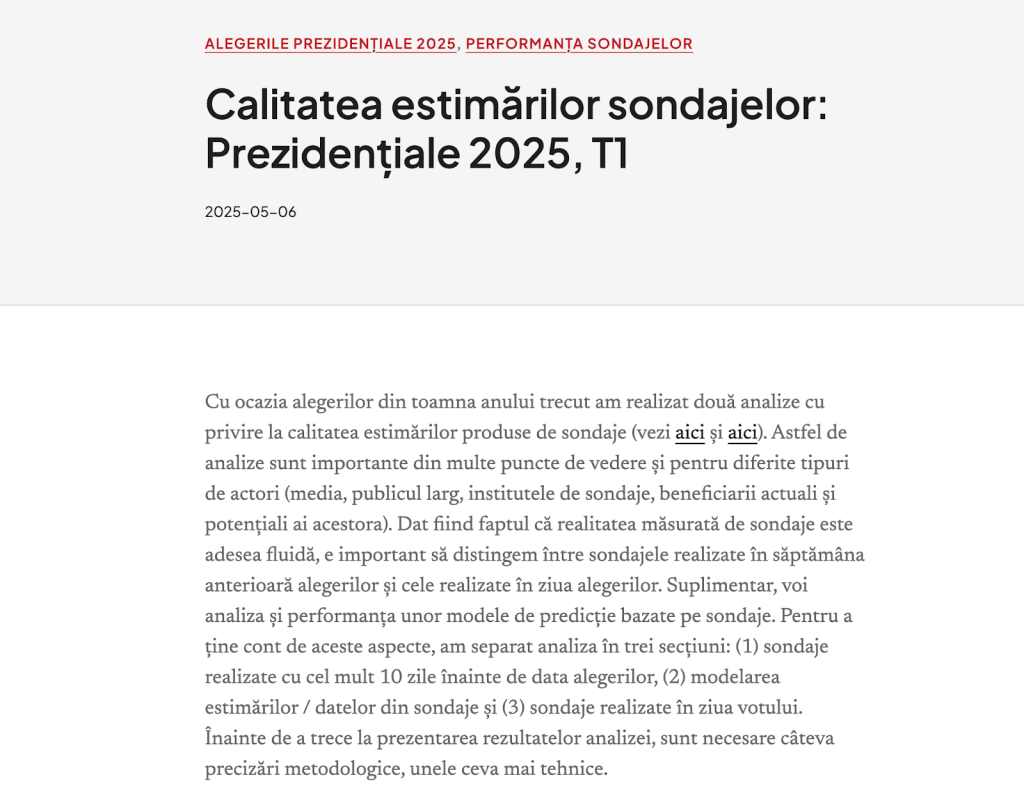
In evaluating the quality of polls, Mircea uses the MAE and RMSE measures to compare polling errors before the elections.
- MAE (Mean Absolute Error) shows how far, on average, the poll estimates were from the actual results, regardless of whether the poll overestimated or underestimated the scores. It is a simple and intuitive measure: the smaller the MAE value, the more accurate the estimate.
- RMSE (Root Mean Square Error) offers a similar measure but penalizes large errors more severely. Thus, RMSE is more sensitive to polls that are significantly off for a single candidate, even if the rest of the estimates are correct.
In short: MAE measures the “average distance” from reality, while RMSE highlights large errors. In both cases, a lower value indicates a better prediction.
According to the analysis: almost all polls conducted within 10 days before the election had average errors larger than the three-percentage-point threshold, with one notable exception: MKOR, which recorded MAE = 2.4 (slightly below the threshold) and RMSE = 3.1 (slightly above the threshold).
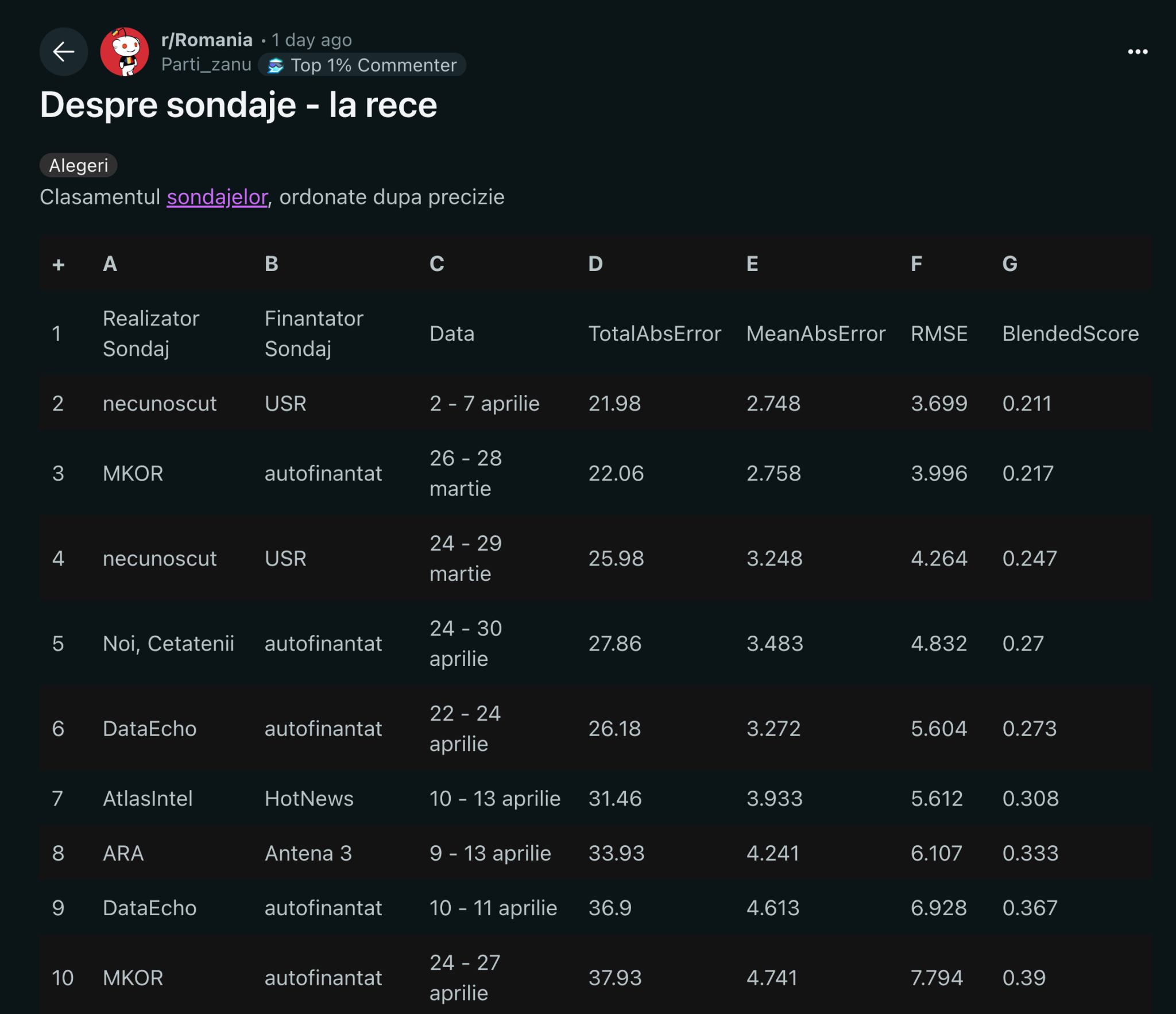
On Reddit România, a ranking analysis highlighted that although MKOR conducted a smaller volume of polls, it delivered consistent estimates with low bias, surpassing the performance of many established institutes.
One of the key insights: the rankings converge toward the same key conclusion—quality does not come from notoriety or volume, but from methodological rigor.
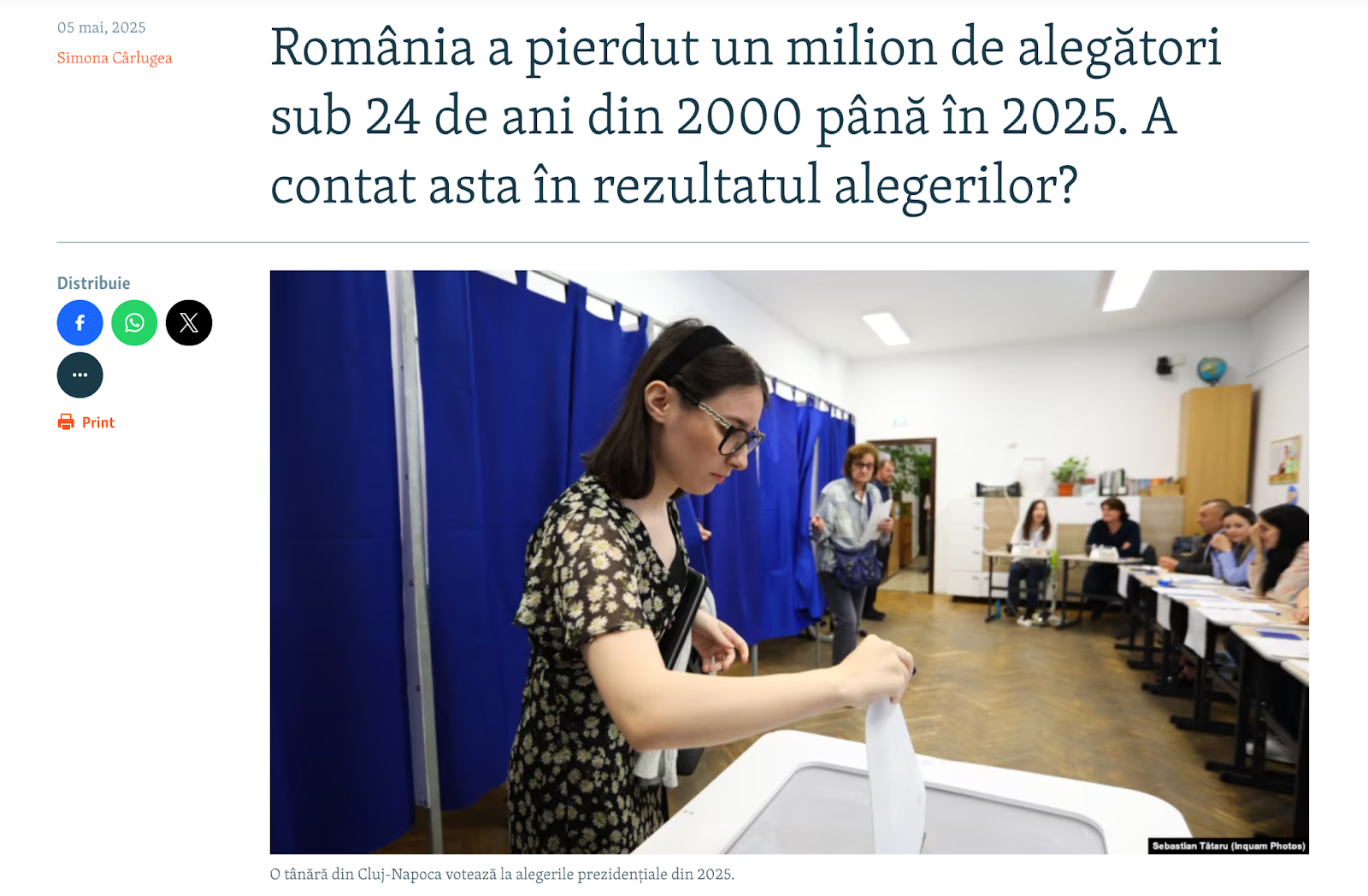
In addition, Europa Liberă confirmed the accuracy of MKOR’s socio-demographic analysis regarding voter profiles, particularly among young people. Our study was the only one cited for having precisely anticipated the ranking of candidates in the elections on Sunday, May 4, as well as the significant behavioral differences across voter categories—an essential element in understanding the election results.
📣 MKOR, Officially Recognized by Europe Elects as the Agency with the Lowest Error Rate in the 2025 Presidential Elections
The international organization Europe Elects reviewed all pre-electoral polls published before the first round of the May 4, 2025 elections and confirmed:
MKOR delivered the most accurate estimate, with an average error rate of just 3.36%—the lowest among all institutes analyzed, regardless of methodology (CATI or online).
„Average error rates ranged from 3.36% (MKOR) to over 6% (ARA, CURS)…” — Europe Elects
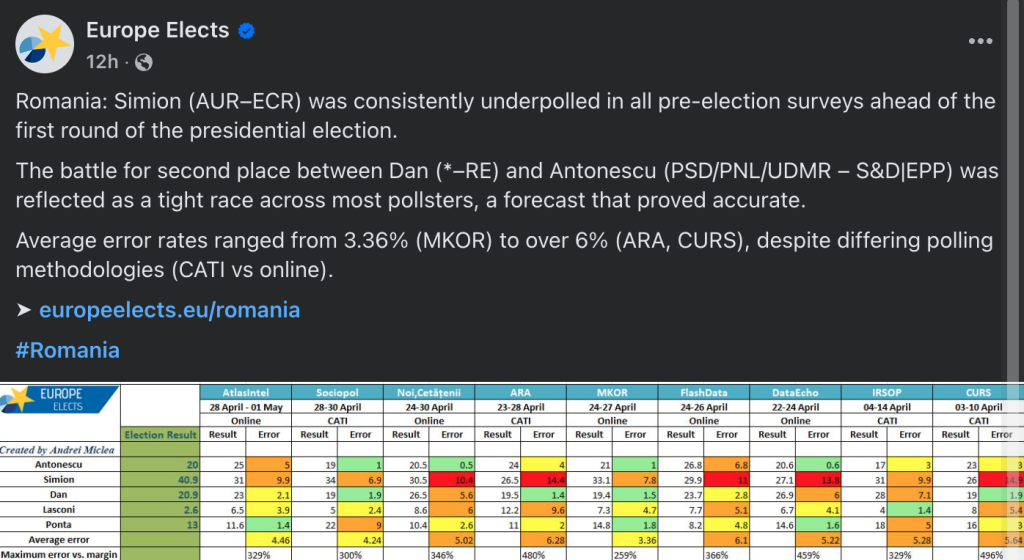
This new international validation comes in addition to the analyses conducted by Professor Mircea Comșa, the Reddit Romania community, and the journalists of Radio Free Europe, all of whom confirmed the accuracy and relevance of our estimates.
Numbers don’t lie. And when data are collected correctly, they tell the truth even before the ballots are counted.
These independent sources validate MKOR’s approach, confirming that transparency, methodological quality, and the ability to capture the real dynamics of the electorate make the difference between a simple poll and a trustworthy prediction.
Top 10 Electoral Polls Ranked by Percentage Point Error
The ranking below is based on the total absolute difference—that is, the sum of absolute differences between each candidate’s estimate and their final result.
This indicator is frequently used in accuracy analyses to assess how close forecasts were to reality:
| Rank | Polling Institute | Fieldwork Dates | Total Absolute Error (pp) |
| 1 | MKOR | 24–27 aprilie | 16,8 |
| 2 | AtlasIntel | 10–13 aprilie | 18,4 |
| 3 | AtlasIntel | 17–22 aprilie | 18,6 |
| 4 | Verifield | 24–28 martie | 19,5 |
| 5 | MKOR | 26–28 martie | 19,4 |
| 6 | Avangarde | 19–23 martie | 20,2 |
| 7 | Sociopol | 28–30 aprilie | 21,3 |
| 8 | AtlasIntel | 28 apr–1 mai | 22,2 |
| 9 | Noi, Cetățenii | 24–30 aprilie | 24,96 |
| 10 | CURS | 3–10 aprilie | 28,16 |
How We Calculated the Error
For each main candidate, we calculated the absolute difference between the poll estimate and the official result. We then summed them to obtain the total error. Example for MKOR:
Error Total = |33,1 − 40,96| + |19,4 − 20,99| + |21 − 20,07| + |14,8 − 13,04| + |7,3 − 2,68| = 16,8
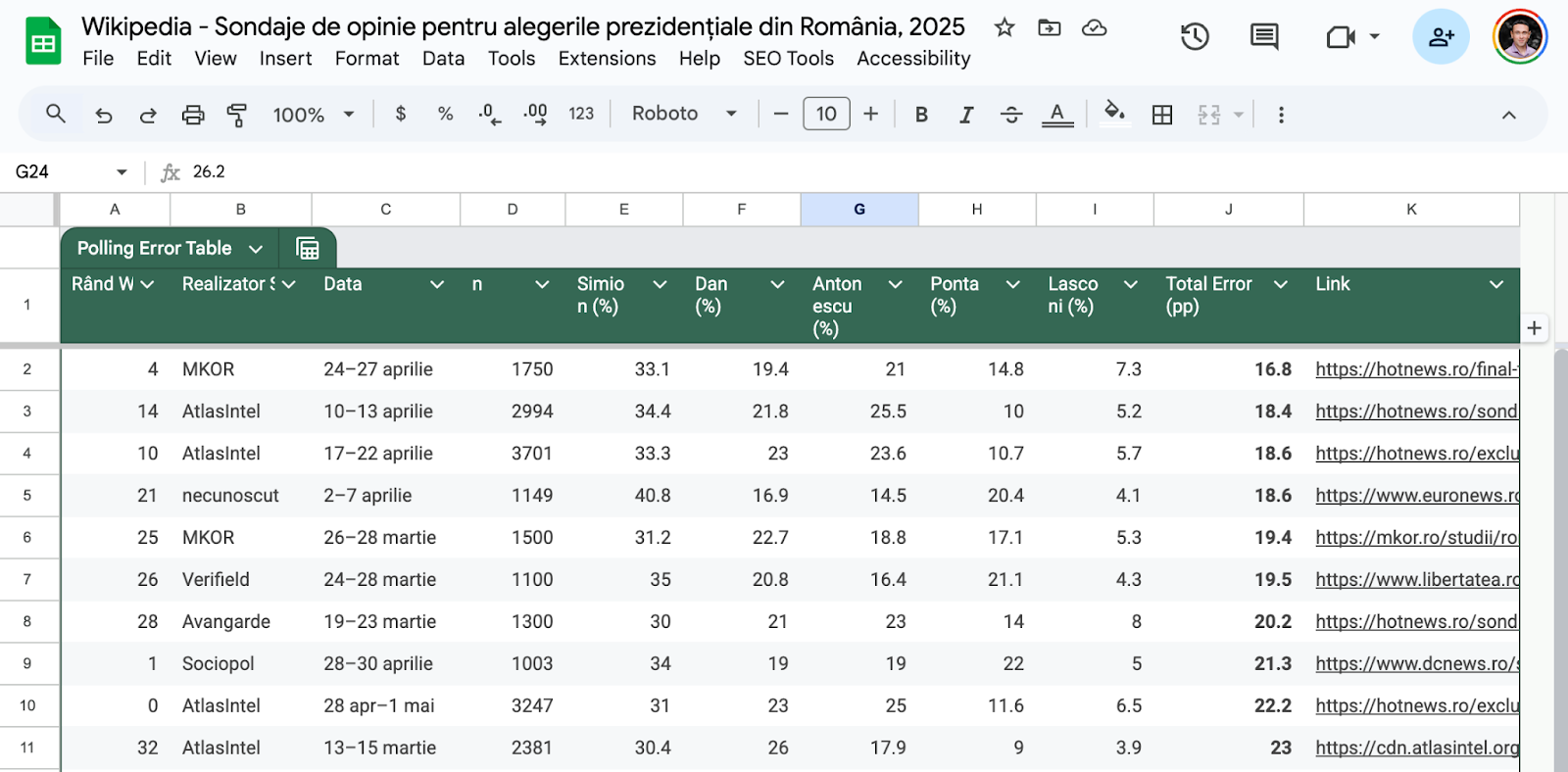
We documented all these calculations in a public sheet based on aggregated data from the article Opinion Polls for the 2025 Romanian Presidential Election (Wikipedia), for full transparency.
Why We Succeeded in Being the Most Accurate
- We closed data collection just one week before the elections, when indecision was still visible, and volatility was high.
- We calibrated the sample according to the profile of those who actually vote, not just the general population.
- We included behavioral variables, not only demographic ones, in our redistribution model.
This level of accuracy is no coincidence. It is the result of a strong methodological commitment and a team of analysts who treated every percentage point with rigor and seriousness.
The Uniqueness of the MKOR Study: Voting Motivations, Analyzed in Depth
Unlike other institutes that focused exclusively on voting intention, MKOR’s study was the only one that analyzed the motivations behind political choices, through an open-ended question addressed to all respondents.

This qualitative approach allowed us to go beyond the raw data, gaining deeper insights into who people vote for and, most importantly, why.
The results of this unique analysis, available in the cloud database published by MKOR (April and May), reveal the social values, voices, and emotions that decisively influence electoral behavior in Romania.
Why Accuracy Matters in Electoral Polls
In a tense and polarized electoral climate, opinion polls become much more than simple statistical snapshots. They are essential tools for understanding social realities, anticipating voting directions, and building well-informed democratic debates.
For voters, accurate polls mean transparency and trust.
They provide a clear perspective on electoral dynamics, helping the public understand who the real contenders are, what alternatives exist, and where their vote carries weight.
In a mature democracy, voters need clear data, not speculation.
For candidates and parties, accuracy is critical in making strategic decisions.
From campaign messaging to resource allocation and voter mobilization, every percentage point counts.
A precise poll can be the difference between an efficient campaign and a wasted effort.
For the mass media and public opinion, accurate figures provide an objective framework for analysis.
In a media landscape dominated by partisan interpretations or sensational narratives, independent accuracy anchors the discussion in facts, not impressions.
However, accuracy is never a given. Pre-electoral polls face numerous challenges:
- Volatility of voting intentions at the last moment, especially among undecided voters or those who change preferences shortly before election day.
- Under-representation of certain voter groups, such as the Diaspora or demographics less inclined to participate in surveys.
- Distortions caused by polarization and the effects of social desirability bias, where respondents may understate or overstate support for particular candidates.
In this context, MKOR has taken on the mission of delivering data as close to reality as possible, using rigorous methodology, representative national sampling, and continuous adaptation to the complexity of Romanian society.
Our April 24–27, 2025 poll (the last before election day) was not just a statistical exercise—it was a commitment to accuracy.
More than that, our study assumed political relevance in a responsible and transparent manner. In a context where polls often represent one of the last public signals before voters make their decision, it was a civic gesture that earned the trust of Romanians on May 4.
What Accuracy Means for Voters, MKOR, and the Future of Research
For voters, parties, and journalists, the accuracy of a poll is not just a statistical exercise—it is an essential tool for correctly understanding electoral reality.
Accurate polls provide reliable benchmarks for campaign strategies, for estimating turnout, and for combating disinformation. In a context dominated by polarization, distrust, and fake news, correct data becomes a civic act in itself.
For us, MKOR, this validation of our data by the May 4th election results is further confirmation of our commitment to quality, rigor, and responsibility toward the research process.
We don’t just conduct polls, we produce studies—we deliver trust, real data, as we like to say. The fact that we provided the closest estimate to the actual results shows that our methodologies work, even under the most volatile political conditions.
Our goal was not only to be correct, but also to be relevant. In a campaign marked by uncertainty, our mission was to offer a faithful picture of electoral reality—and the accuracy validated by the results confirms that we are on the right track
![]()
Cori Cimpoca – MKOR Founder
What’s Next?
We will soon publish the analysis of electoral behavior from the second round, focusing on voting flows and the profiles of those who changed their choice compared to the first round.
Explore the Data. Share It. Research with Us.
Results speak for themselves, and our data is public. See the full MKOR poll report here and compare our estimates with the reality on election day.
If you want relevant data to guide your strategy, write to us—we conduct personalized, fast, and relevant research for your specific context.
We want our data to reach as many people as possible who are interested in democracy and transparency.
We invite you to:
- Share this article on social media.
- Follow us on LinkedIn, Facebook or Instagram.
- Contact us for opinion studies, audience analysis, or advanced segmentation.
At MKOR, we turn data into decisions. Let’s work together!
MKOR: The Most Accurate Polling House in the 2025 Presidential Elections
The May 4, 2025 elections demonstrated the critical importance of accuracy in opinion research. In a volatile electoral climate, with candidate withdrawals, abstention, and heightened polarization, MKOR managed to deliver the analysis with the lowest error margin among all pre-electoral polls.
With a total error of just 16.8 percentage points for the main candidates, MKOR ranked at the top of the accuracy leaderboard, ahead of many established names in the industry.
This achievement further reinforces our commitment to methodological rigor, representative sampling, and accountability toward data accuracy.
We will continue to monitor developments in the second round and are preparing new analyses to better understand the dynamics that truly influence Romanian voters.
Because in the end: every percentage point matters, every estimate is a responsibility, and every piece of data must be handled with care.
Have you read everything? Comment / join our newsletter / read our other research posts!
MKOR Survey: Romania Votes for Its Future in the Second Round of the 2025 Presidential Elections
September 11, 2025
0 Comments28 Minutes







